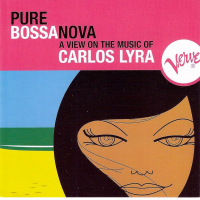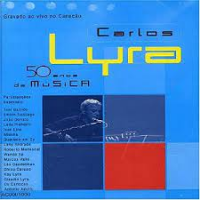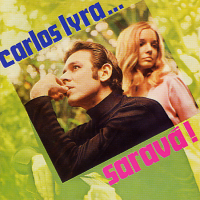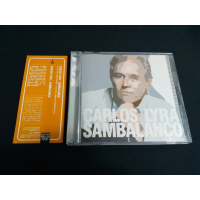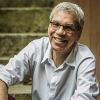Home » Jazz Musicians » Carlos Lyra
Carlos Lyra
When Tom Jobim affirms that Carlos Lyra is the great "connoisseur of the paths", the master does not exaggerate.An exceptional melodist, Lyra was born historically together with bossa nova. His inspired melodies have resisted over the years, proving that the true path is artistic independence. Lyra and bossa nova are enmeshed, but the author of Primavera has always maintained his musical identity. The first song by Lyra to be recorded on an LP (Criticando, recorded in 1956 by the group Os Cariocas) is a forerunner of the classic Influência do jazz and already showed that the author would maintain his autonomy in relationship to the old bossa, although history would place him in the role of one of the natural leaders of the bossa nova movement (if one can talk about a "movement").
Lyra’s identity is sharply and immediately revealed in his first record, Carlos Lyra, bossa nova, released in 1959. And a certain Maria Ninguém was already imposing her presence next to classics such as Quando chegares, Menina and Rapaz de bem (a composition by Johnny Alf which Lyra launched).
Even at this early date, Lyra’s musical universe was no longer restricted to the delicious salt, sun and “Sul” carioca (the sophisticated southern district of Rio de Janeiro). Although this would only become apparent in the second and divergent phase of the - well, why not - movement.
The latent dichotomy which germinated among the bossa novists would spring to the fore more strongly in 1961. In this year, Lyra releases his second record with jewels such as Minha namorada, Você e eu and Coisa mais linda. But his head (and his guitar) were already pointing in another direction. This same year, he becomes one of the founders of the Centro Popular de Cultura, the popular CPC of the UNE (União Nacional dos Estudantes or National Student Union. The CPC was a student organization that counted on the orientation of a pool of intellectuals from diverse areas of culture). This tie, ever more closely linked to theater and cinema (which in this period was also “New”), politicizes Lyra’s work. Of course, nothing comes about quite so abruptly. In 1960, Lyra had already composed the score for the play A mais valia vai acabar, Seu Edgar, written by political militant Oduvaldo Vianna Filho. Not to mention Lyra’s later collaboration with the directors of the Arena Theatre.
The foundation was in place for Lyra to transform the bossa of "love, smiles and flowers" (in reference to the first phase of bossa nova) into music with both feet firmly planted on the ground, consistent with a reality which was already beginning to show signs of political incoherency. Lyra immediately joined the group of dissidents and activists, bringing dissonance to all the choruses formed by those satisfied with the "cool" (and already distant) aesthetic of the song and the poetry of João Gilberto and Company. Lyra’s third record, released in 1963, now brought Influência do jazz and Aruanda. The samba left the apartment of the middle class southern district to climb up the hills toward the shantytowns and "favelas". In the opposite lane, Zé Keti, João do Vale, Nelson Cavaquinho and Cartola were coming down toward the city's asphalt and the CPC (Centro Popular de Cultura, the Popular Center for Culture), to show that all was not flowers in that Brazil of 1963 and 1964. Lyra was already aware of this. The conscientious Canção do Subdesenvolvido composed in 1963 together with Chico de Assis, already made explicit an ideology uncomfortable for more conservative sectors.
Read moreTags
Carlos Lyra (1933-2023)

Source:
JazzWax by Marc Myers
Carlos Lyra, a Brazilian singer-songwriter and guitarist, and one of the fathers of the bossa nova who, with Antonio Carlos Jobim, Vinicius de Moraes, Luiz Bonfá, Roberto Menescal and Ronaldo Bôscoli, among others, turned a new form of middle-class aspirational music into a global sensation, died in Rio de Janeiro on December 16. He was 90. In the same league as Jobim in terms of poetic lyricism and musical beauty, Lyra composed dozens of aching bossa-nova love songs that have ...
read more
Carlos Lyra: Além da Bossa

Source:
JazzWax by Marc Myers
In the late 1950s, Rio de Janeiro experienced enormous optimism. North American trade was on the rise, and the advent of jet travel between Brazil, France and the U.S. boosted tourism. Business at the city's hotels, lounges and restaurants soared. Throughout Rio, a new form of music was stirring. It was more jazz-romantic and folk-centric than the whistle-infused samba. It also was intimate and expressive, and celebrated the sensuality and cool of the young beach crowd. When João Gilberto released ...
read more
Interview: Carlos Lyra

Source:
JazzWax by Marc Myers
Just before the British Invasion turned American teens into screaming consumers, a new style of romantic music with a jazzy Latin feel captured the hearts of young adults in the States. Known as the bossa nova, the music was a cooler cousin of Cuba's cha-cha-cha and a sophisticated folk form that was highly melodic and notably relaxed. What's more, the bossa nova crossed borders effortlessly and was highly addictive not only in Brazil but also in France and the U.S. ...
read more
BossaBrasil Marcos Valle & Carlos Lyra "Bossa Nova History At Birdland" From May 26- 30

Source:
Michael Ricci
Delta Air Lines presents BossaBrasil Marcos Valle and Carlos Lyra With Patricia Alvi (vocals), Renato Massa (drums), Itaiguara Brandao (bass) Jorge Continentino (sax & flute) Forty years after it swept the world, Bossa Nova stands as as one of the enduring musical forms of the 20th century! MARCOS VALLE, legendary Brazilian Composer/Keyboardist says, “CARLOS LYRA is my idol. It is my great pleasure to join with him at my favorite Jazz Club, Birdland.” While many of its architects—the creators of ...
read more
Pure Bossa Nova | Carlos Lyra | Album

Source:
All About Jazz
Carlos Lyra is part of the first generation of Bossa Nova songwriters. After writing hits for the first albums of Joo Gilberto, he soon released his first solo album as a singer on Philips (1959). His greatest hits were written in the '60s and many of them are considered to be immortal all-time classics of Brazilian popular music, going from romantic to “swing Bossa," with some doses of protest and nonconformity usual in Brazil at that ...
read more


